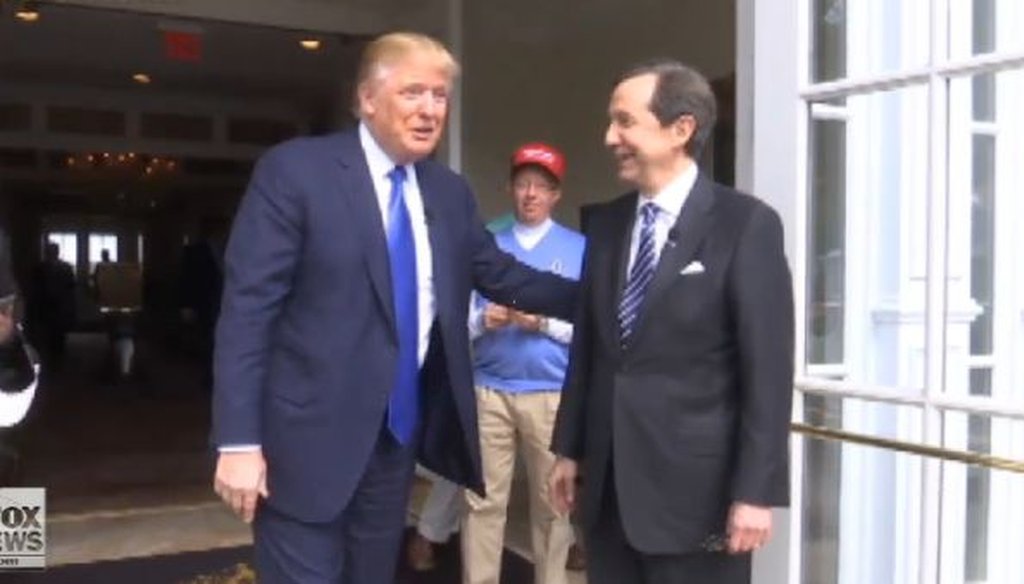Stand up for the facts!
Our only agenda is to publish the truth so you can be an informed participant in democracy.
We need your help.
I would like to contribute

Donald Trump joined Fox News' Chris Wallace for an interview at one of his golf properties. The interview aired on Oct. 18, 2015.
Donald Trump is a reality TV star. But on Fox News Sunday, he was more interested in television sets than the programs playing on them.
"I just ordered 4,000 television sets. You know where they come from? South Korea," Trump said on Oct. 18. "I don’t want to order them from South Korea. I don’t think anybody makes television sets in the United States anymore. I don’t want to order from South Korea, I want to order from here."
Is Trump right that the United States stopped manufacturing TVs? Our research found that Trump is wrong to suggest that the United States doesn’t make TVs at all any more, though he has a point that we don’t make nearly as many as we used to. We rated his claim Half True.
A spokesperson for the Alliance for American Manufacturing told us the group is only aware of two American companies currently manufacturing or assembling TVs in the United States: Séura in Green Bay, Wisc. and Element Electronics in Minnesota and South Carolina. (We asked the Trump campaign for evidence, but didn’t hear back.)
That’s a far cry from the the 1950s, when there were 90 to 150 television manufacturers in the United States churning out 11 million television sets per year.
But facing aggressive competition from Japan and later from South Korea, just three American makers remained by 1980: the Radio Corporation of America (RCA), Zenith, and GTE-Sylvania (which stopped making consumer electronics in the 1980s).
In 1986, RCA was acquired and broken up by General Electronics. Zenith, then the third-largest and last remaining American TV maker, "gave up its battle to survive on its own" in 1995 and was sold to the South Korean giant, LG Electronics, according to the New York Times.
Today, two of the three largest TV makers worldwide are South Korean (Samsung and LGE) and one is Japanese (Sony). Together, they account for about half of the flat screen market. Overall, according to numbers from the United Nations Commodity Trade Statistics Database, the United States imports far more TVs than it exports.
Cruz on the GOP leadership
Meanwhile, on Meet the Press, Ted Cruz, a Republican senator running for president, had to answer questions about tensions with his own party’s leadership in the Senate. Moderator Chuck Todd asked Cruz how he could lead the country when he couldn’t seem to get along with his fellow senators.
Cruz defended his approach, arguing that "the American people are furious with Republican leaders that don't do what they promised." Among other things, he said, the GOP leadership "took the lead confirming Loretta Lynch as attorney general. Now Chuck, which one of those decisions is one iota different than what would happened under Harry Reid and the Democrats?"
We took a closer look at Cruz’s claim that the "Republican leadership took the lead confirming Loretta Lynch as attorney general." We rated his claim Mostly False.
Lynch -- the designated successor to President Barack Obama’s first attorney general, Eric Holder -- was confirmed by the Senate on a 56-43 vote on April 23, 2015. The Republican leadership did put the confirmation vote on the calendar -- which was its constitutional responsibility given that the GOP had won back control of the chamber during the 2014 midterm elections.
However, it’s not accurate to say that the GOP hierarchy "took the lead" on getting Lynch confirmed. Thanks to the efforts of GOP leaders, Lynch’s path to confirmation was, by the standards of recent attorney general nominees, long and torturous.
From from Nov. 13, when Lynch was first nominated, until her confirmation, she saw her appointment stuck in limbo for 161 days. By comparison, the longest confirmation wait for an attorney general nominee going back to Ronald Reagan’s presidency was 30 days. The shortest was just three days.
The direct reason for Lynch’s delay was that Senate Majority Leader Mitch McConnell, R-Ky., insisted on passing a pending human-trafficking bill before taking up Lynch’s nomination. On the whole, the anti-trafficking bill was uncontroversial, but it had become a bone of contention between the parties due to a battle over some of its language about abortion.
After weeks of stalemate, Senators reached a compromise on the abortion issue and, on April 22, passed the measure by a 99-0 vote. That cleared the way for the chamber to take up Lynch’s nomination.
"McConnell acted like a conservative leader of a fairly conservative party in the Senate, getting as much as he could before grudgingly allowing the nomination to go forward," said Burdett Loomis, a University of Kansas political scientist and longtime Senate observer.
"It was Democrats who demanded action on the the Lynch nomination, not McConnell," agreed Steven S. Smith, a political scientist at Washington University in St. Louis. "McConnell removed obstacles to the consideration of the nomination, but that is far from taking the lead or championing the effort to confirm Lynch."
Our Sources
See original Truth-O-Meter items.









































